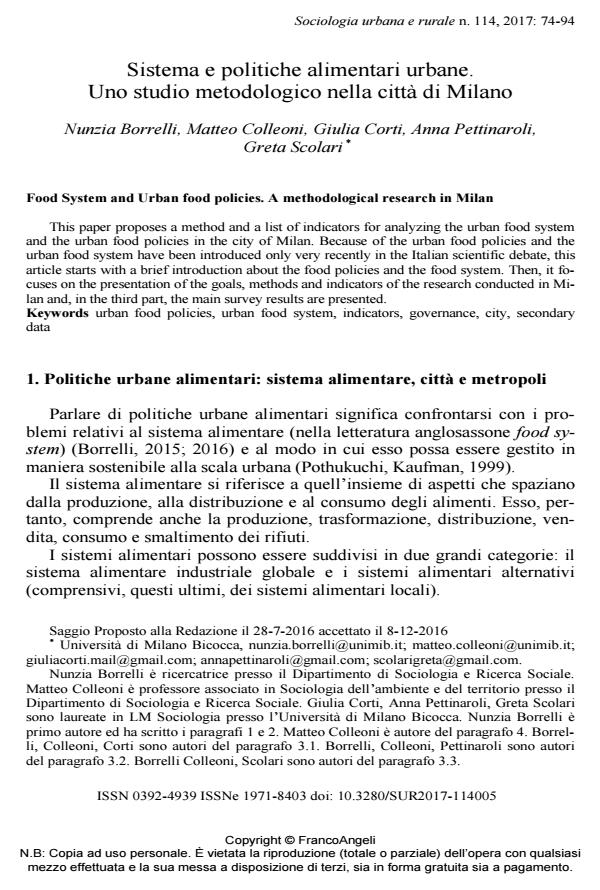Food System and Urban food policies. A methodological research in Milan
Journal title SOCIOLOGIA URBANA E RURALE
Author/s Nunzia Borrelli, Matteo Colleoni, Giulia Corti, Anna Pettinaroli, Greta Scolari
Publishing Year 2017 Issue 2017/114
Language Italian Pages 21 P. 74-94 File size 455 KB
DOI 10.3280/SUR2017-114005
DOI is like a bar code for intellectual property: to have more infomation
click here
Below, you can see the article first page
If you want to buy this article in PDF format, you can do it, following the instructions to buy download credits

FrancoAngeli is member of Publishers International Linking Association, Inc (PILA), a not-for-profit association which run the CrossRef service enabling links to and from online scholarly content.
This paper proposes a method and a list of indicators for analyzing the urban food system and the urban food policies in the city of Milan. Because of the urban food policies and the urban food system have been introduced only very recently in the Italian scientific debate, this article starts with a brief introduction about the food policies and the food system. Then, it focuses on the presentation of the goals, methods and indicators of the research conducted in Milan and, in the third part, the main survey results are presented.
Keywords: Urban food policies, urban food system, indicators, governance, city, secondary data
- Agriculture Sustainability Institute University of California Davis. (2010). Assessing the San Diego Country Food System: Indicators for a More Food Secure Future. Disponibile a http://asi.ucdavis.edu/programs/sarep/publications/food-and-society/sdcountyfoodshedassessment2010.pdf
- Bailkey M., Naser J. (1999). From Brownfields to Greenfields: Producing Food in North American Cities. Community Food Security News, Fall/Winter.
- Blay-Palmer A., Sonnino R., Custot J. (2015). A food politics of the possible? Growing sustainable food systems. Agriculture Human Values, 1 27-43.
- Born B., Purcell M. (2006). Avoiding the local trap: Scale and food systems. Planning Research. Journal of Planning Education and Research, 26-2: 195-207.
- Borrelli N. (2015). Between smart and slow: a short introduction to the Food System. Collana Keywords Fondazione Feltrinelli Ebook.
- Borrelli N. (2016). Governance urbana del food system. Un’introduzione al dibattito. Critica degli ordinamenti spaziali, 11: 51-62. DOI: 10.3280/CRIOS2016-011005
- DEFRA (Department for Environment, Food and Rural Affairs). (2009). Indicators for a Sustainable Food System. Testo disponibile al sito: http://www.scp-knowled-ge.eu/sites/default/files/knowledge/attachments/Defra_2011_Indicators%20for%20a%20sustainable%20food%20system.pdf.
- Di Dio G., Mezza L. (2014). La performance delle imprese attraverso i dati di Bilancio cap. 6 del 24 rapporto annuale- Milano produttiva - della Camera di Commercio di Milano. Disponibile a http://www.mi.camcom.it/documents/10157/31142418/milano-produttiva-2016.pdf/561c5b57-5363-44dd-9fca-7ae2f23600ac
- ESTA’ (2015). I numeri del sistema food Milano. Disponile a http://www.foodpolicymilano.org/wp-content/uploads/2015/04/I-numeri-del-sistema-alimentare.pdf
- Gatti A.C., Magni G., Montrasi S., Ricci I. (2014). Verso EXPO 2015. Gli Stili alimentari dei milanesi. Comune di Milano, Settore Statistica.
- Grievink W. (2003). The Changing Face of the Global Food Industry. OECD Conference, Paris.
- Institute of Portland metropolitan studies. (2008). Planting Prosperity and Harvesting Health, Trade-offs and Sustainability in the Oregon-Washington Regional Food System. http://www.pdx.edu/sites/www.pdx.edu.ims/files/media_assets/ims_foodsystemsfinalreport.pdf
- Mertens M. (2014). Implications of Local and Regional Food Systems: Toward a New Food Economy in Portland. Portland State University - Oregon Dissertations and Theses.
- Morgan K.J., Sonnino R. (2010). The Urban foodscape: world cities and the new food equa-tion. Cambridge Journal of Regions, Economy and Society, 2: 209-224.
- Pothukuchi K., Kaufman J.L. (1999). Placing the food system on the urban agenda: The role of municipal institutions in food systems planning. Agriculture and Human Values, 2: 213-224. DOI: 10.1023/A:1007558805953
- Segrè A. (2014). Spreco. Torino: Rosenberg & Sellier.
- Sonnino R. (2014). The new geography of food security: exploring the potential of urban food strategies. The Geographical Journal, 2.
- Steel C (2008). Hungry City: How Food Shapes Our Lives. London: Vintage Digital
- Stierand P. (2012). Food Policy Councils: recovering the local level in food policy, in Sustainable food planning, evolving theory and practice. In Viljoen A., Wiskerke, J.S.C. Sustainable food planning: evolving theory and practice. Wageningen: Academic Publishers.
- Wascher D.M., Kneadsey M., Pintar M (eds.) (2015). FoodMetres - Food Planning and In-novation for Sustainable Metropolitan Regions. Preliminary Report 2015.
- Waste Watcher (2015). Knowledge for Expo. Tutela dell’ambiente, abitudini delle famiglie e spreco alimentare. Last Minute Market Srl.
- Williams L.K., Abbott, G., Thornton L.E., Ball K., Crawford D. (2014). Improving perceptions of healthy food affordability: results from a pilot intervention. International Journal of Behavioral Nutrition and Physical Activity, 11. DOI: 10.1186/1479-5868-11-3
- Practices of Food Sovereignty in Italy and England: Short Food Supply Chains and the Promise of De‐Commodification Raffaele Matacena, Paolo Corvo, in Sociologia Ruralis /2020 pp.414
DOI: 10.1111/soru.12283
Nunzia Borrelli, Matteo Colleoni, Giulia Corti, Anna Pettinaroli, Greta Scolari, Sistema e politiche alimentari urbane. Uno studio metodologico nella città di Milano in "SOCIOLOGIA URBANA E RURALE" 114/2017, pp 74-94, DOI: 10.3280/SUR2017-114005